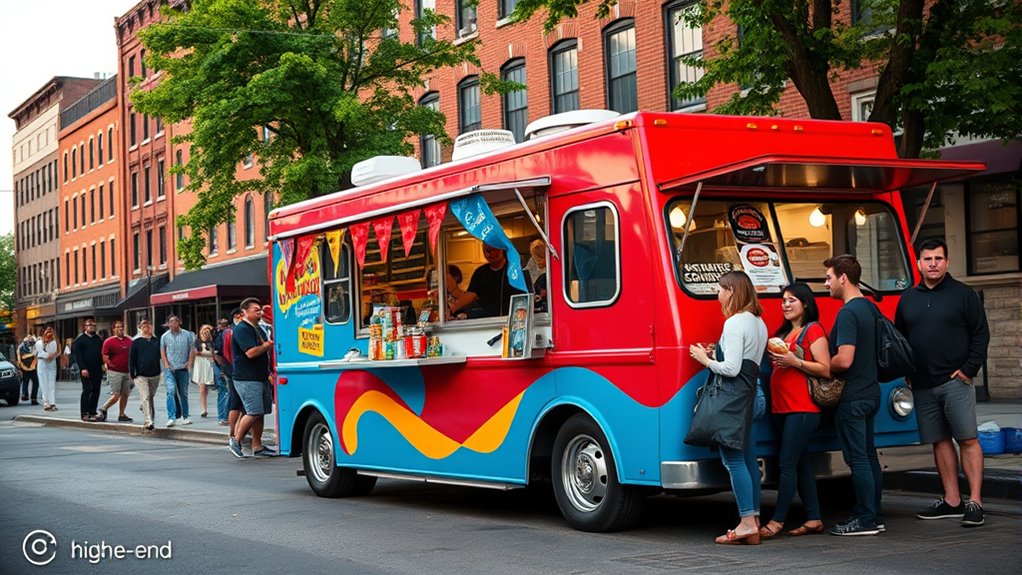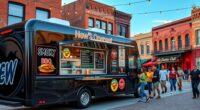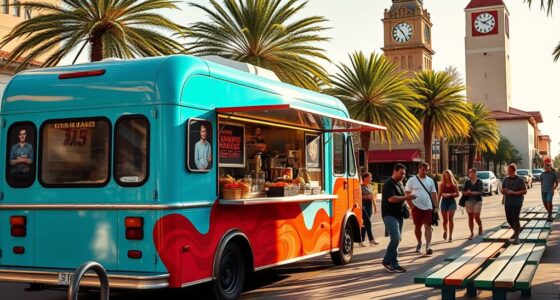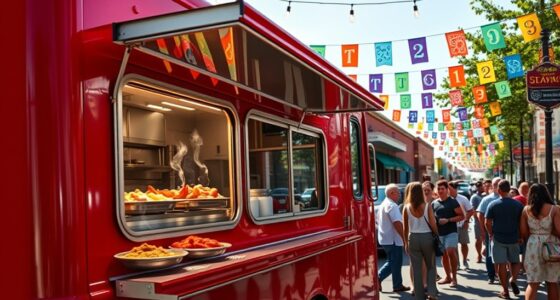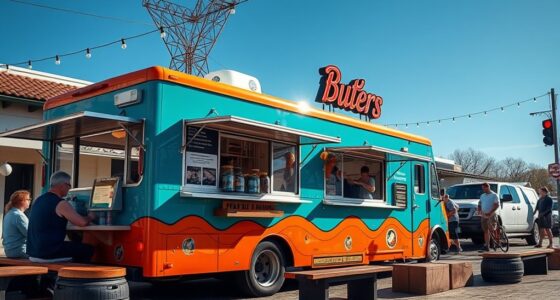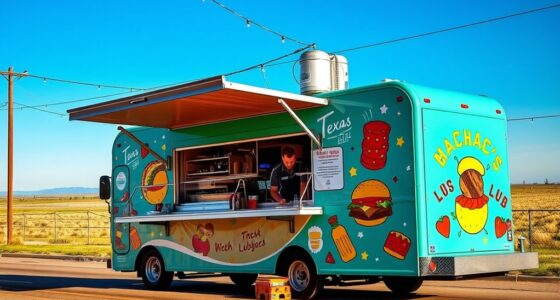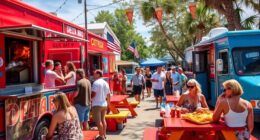To start a food truck in Worcester, MA, you need a solid business plan that covers your target market, menu, and pricing. Obtain all necessary permits, licenses, and health inspections from local authorities. Find a suitable base, budget carefully, and invest in essential equipment. Design a menu with local flavors and develop a marketing plan to grow your presence. If you keep exploring, you’ll discover detailed steps to make your food truck a success.
Key Takeaways
- Develop a comprehensive business plan including target market, menu, pricing, and food safety procedures tailored to Worcester.
- Obtain necessary permits and licenses from Worcester’s Office of Consumer Affairs and health department.
- Choose an appropriate location and comply with Worcester’s zoning and operating restrictions for food trucks.
- Budget for startup costs, equipment, and inventory, and explore local grants or funding options.
- Design a menu incorporating Worcester’s local flavors, seasonal ingredients, and cost-effective pricing strategies.
Starting With a Business Plan
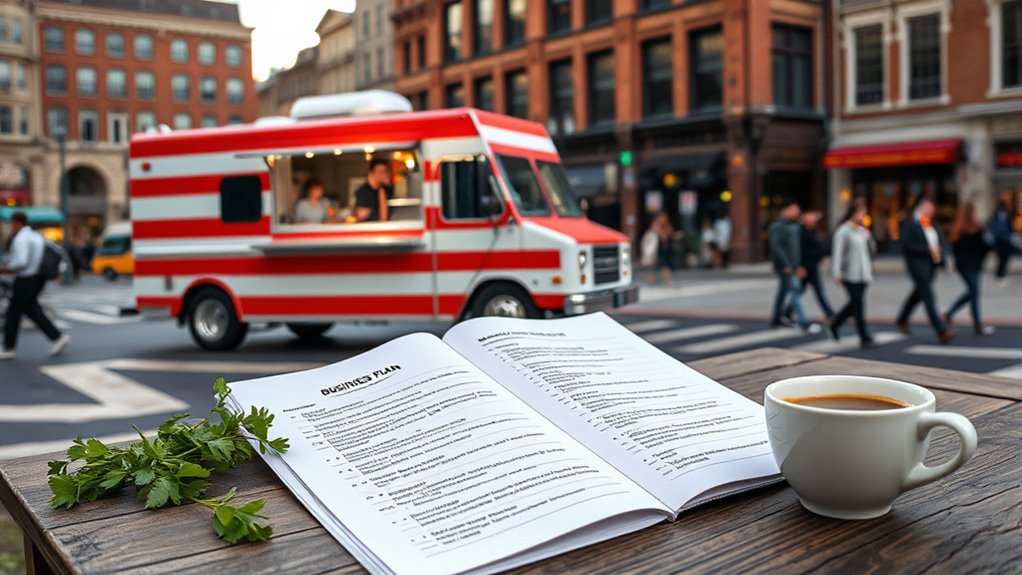
Creating a solid business plan is the essential first step when starting a food truck in Worcester, MA. Your plan should outline your target market, menu, and pricing strategy. Prioritize food safety by detailing procedures for proper handling, storage, and sanitation to meet health regulations. Excellent customer service is key to building loyalty, so include plans for staff training and customer interaction. A clear business plan helps you identify startup costs, forecast revenue, and set achievable goals. It also acts as a roadmap for steering licenses, permits, and local regulations. Additionally, incorporating the latest hardware news and technology solutions can streamline operations and improve customer experience. By establishing these fundamentals early, you ensure your food truck operates smoothly, prioritizes safety, and delivers exceptional service, setting a strong foundation for long-term success.
Understanding Local Requirements
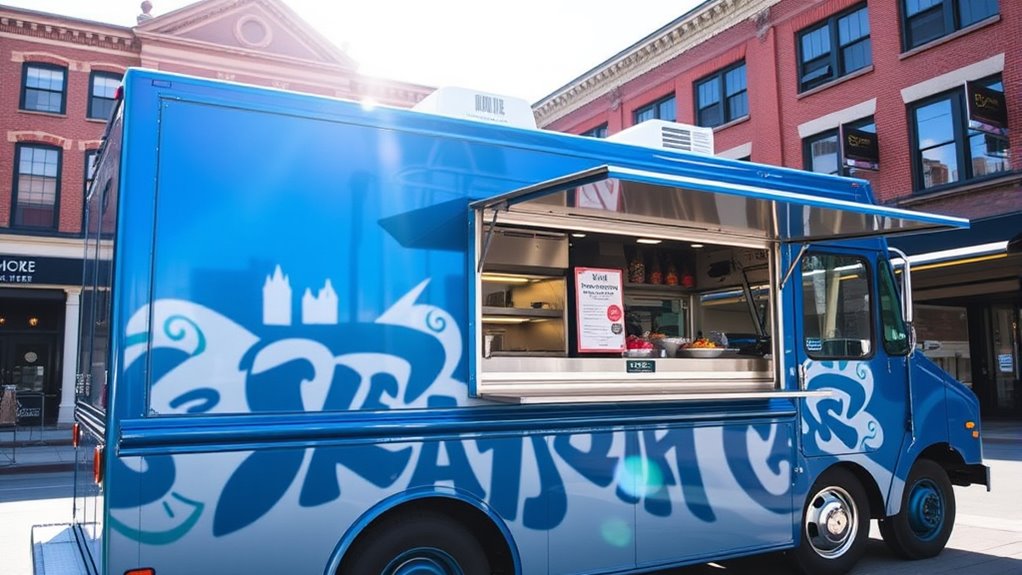
To get started, you’ll need to understand Worcester’s application process and gather the necessary documents to register your food truck. You’ll also want to review the health inspection checklist to make certain your truck meets safety standards. Additionally, familiarize yourself with designated food truck zones to plan where you’ll operate within the city. Considering the local regulations, it’s important to be aware of any daily operating restrictions that might affect your schedule and location choices.
Application Process and Required Documents
Before launching your food truck in Worcester, MA, it’s essential to understand the local application process and the required documents. First, you’ll need to obtain your food truck permits, which verify your vehicle meets safety and operational standards. Second, securing vendor licensing is necessary to legally sell food in public spaces. Third, prepare essential documents like proof of insurance, valid identification, and a detailed menu. The application process involves submitting these documents to the Worcester Office of Consumer Affairs and Business Regulation. Make sure all paperwork is complete and accurate to avoid delays. Understanding these steps ensures you’re compliant with local regulations and ready to serve. With your permits and licenses in hand, you’ll be set to hit the streets confidently.
Health Inspection Checklist Overview
Once you’ve secured your permits and licenses, the next step is passing the health inspection. You’ll need to understand Worcester’s specific inspection standards to ensure your food truck meets all requirements for food safety. The health inspection checklist covers critical areas like proper food handling, storage, and sanitation practices. Make sure your cooking equipment is clean and functioning correctly, and that temperatures for storing perishable items stay within safe ranges. Your staff should follow strict hygiene protocols, including regular handwashing and glove use. The inspector will review your documentation, verify cleaning schedules, and check for pest control measures. Preparing thoroughly for this inspection helps you demonstrate compliance with local food safety regulations and avoid costly delays or re-inspections.
Designated Food Truck Zones
Worcester designates specific zones where food trucks can operate, so understanding these requirements is essential for compliance. Familiarize yourself with local zoning regulations to avoid penalties or permit issues. The city may restrict food truck activity to certain districts or events, impacting your location choices. To get started, make sure you obtain the appropriate food truck permits that specify your operating zones. Here are key points to consider:
- Verify designated zones where food trucks are allowed.
- Check if special permits are required for specific areas.
- Comply with zoning regulations to avoid fines and ensure smooth operation.
Knowing where you can legally operate helps you plan your business effectively and stay within city guidelines. Always stay updated on any zoning changes that could affect your food truck’s location.
Setting Up Your Base of Operations
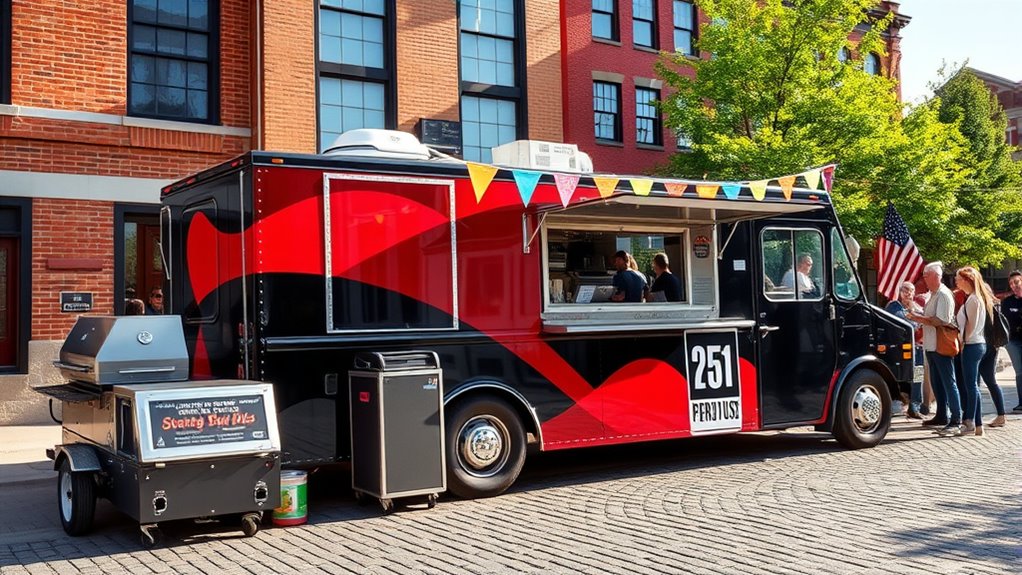
To set up your base of operations, you’ll need to consider shared kitchen licensing requirements and make sure your space meets local health codes. Planning a custom kitchen layout helps maximize efficiency and safety for food prep and storage. By addressing these points early, you’ll create a solid foundation for your food truck business in Worcester. Incorporating traditional wellness practices into your food offerings can also set your truck apart by emphasizing holistic health and cultural connection.
Shared Kitchen Licensing Requirements
Are you aware of the licensing requirements for shared kitchens in Worcester? To operate a shared kitchen legally, you must meet specific licensing requirements. Here are the key steps:
- Obtain a food service license from Worcester’s health department, ensuring your shared kitchen complies with health and safety standards.
- Register your shared kitchen with the Massachusetts Department of Public Health, which oversees food safety regulations.
- Pass a health inspection to verify your facility adheres to sanitation, equipment, and storage standards.
These licensing requirements ensure your shared kitchen operates legally and safely, providing a solid foundation for your food truck business. Staying compliant helps you avoid penalties and builds customer trust in your brand.
Custom Kitchen Layout Planning
Designing an efficient kitchen layout is essential for maximizing workflow and ensuring safety in your food truck’s base of operations. Focus on kitchen ergonomics to make sure everything is within easy reach, reducing unnecessary movement. Start with layout optimization by grouping related tasks—like prep, cooking, and cleaning—to streamline the process. Place heavy equipment, such as fryers and grills, in stable, well-ventilated spots to prevent accidents. Ensure there’s enough counter space for prep work and clear pathways to avoid congestion. Consider the flow of ingredients and utensils to minimize backtracking. By thoughtfully planning your kitchen layout, you’ll improve efficiency, safety, and productivity—key factors for a successful food truck operation in Worcester, MA.
Budgeting and Financing Your Food Truck
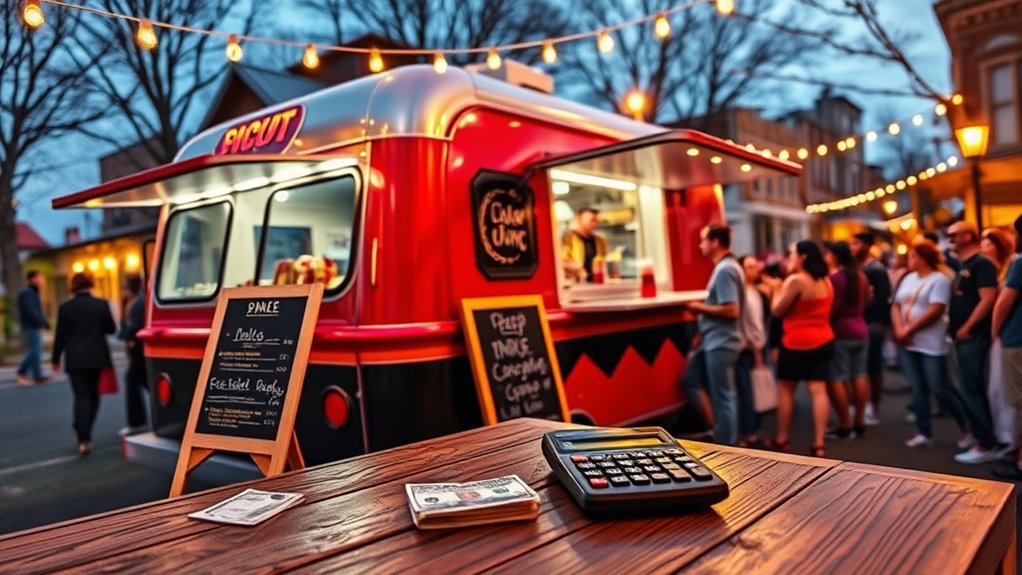
To get your food truck rolling, you need to understand your startup costs, including equipment expenses. Exploring local small business grants can help ease some financial burden, but you’ll also need to stay on top of liability coverage and filing deadlines. Planning your budget carefully guarantees you’re prepared for every step of launching your food truck in Worcester. Additionally, incorporating effective organization strategies can help you maximize your limited space and keep operations running smoothly.
Initial Equipment Investment Breakdown
Starting your food truck business requires careful planning of your initial equipment investment, as this is a significant expense that can impact your overall budget. To get started, focus on essential equipment that supports your food truck branding and menu design.
- Kitchen appliances and cooking tools – these form the core of your menu and must be reliable and efficient.
- Food truck branding materials – including signage, wraps, and interior decor, which attract customers and create a memorable identity.
- Point-of-sale and storage systems – ensuring smooth transactions and proper inventory management.
Budgeting for these items helps you avoid surprises and prioritize investments that will make your food truck stand out. Proper planning ensures your initial equipment investment sets a solid foundation for success.
Local Small Business Grants
Securing funding is a key step in turning your food truck idea into a reality, and local small business grants can be a valuable resource. Worcester offers various funding opportunities designed to support small businesses like yours. These grants can help cover costs such as equipment, permits, and marketing, reducing your upfront expenses. To find available local small business grants, check with Worcester’s economic development office, the Massachusetts Growth Capital Corporation, or local business associations. Applying for grants requires a solid business plan and clear financial goals, so prepare your documents carefully. While grants don’t have to be repaid, competition can be fierce. Explore all options early to improve your chances of securing Worcester funding opportunities that bring your food truck closer to opening.
Liability Coverage and Filing Deadlines
Understanding liability coverage and filing deadlines is essential for budgeting and financing your food truck. Proper liability coverage protects you from costly claims, so make certain you have adequate insurance tailored to food trucks. Missing filing deadlines can lead to fines or license suspension, which can halt your business. To stay on track:
- Keep track of all insurance renewal dates and ensure your liability coverage remains current.
- Mark important filing deadlines for local permits, health department certifications, and state registrations.
- Regularly review your paperwork to avoid missing deadlines that could disrupt your operations.
Designing Your Menu and Pricing Strategy
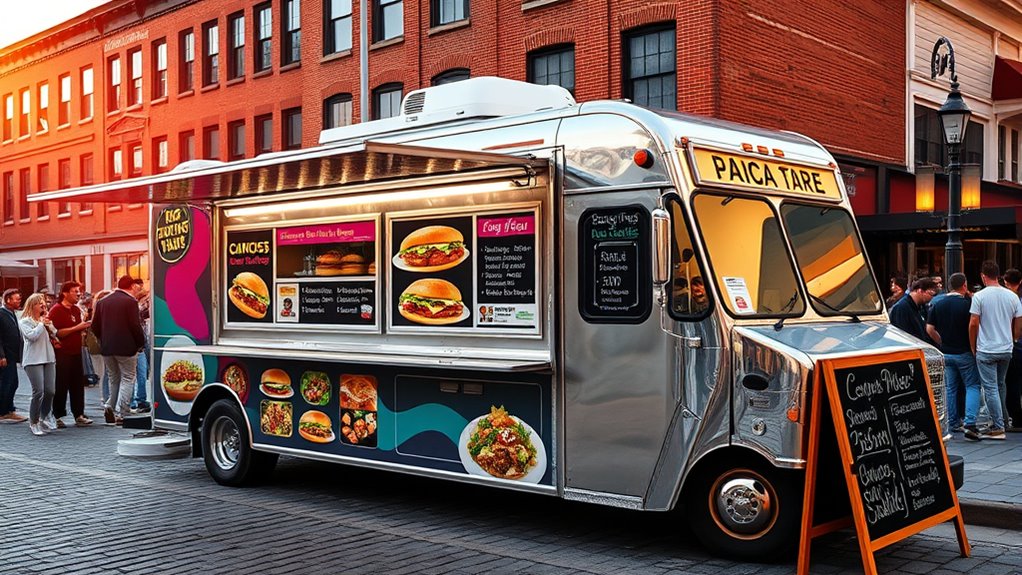
Creating a menu that reflects Worcester’s local flavors can help attract customers and set your food truck apart. Keep ingredient costs in check by sourcing locally and managing portion sizes effectively. Balancing innovative dishes with smart pricing strategies guarantees your menu is both appealing and profitable. Using self-watering planters for your on-site herb gardens can also ensure fresh, consistent ingredients for your dishes.
Locally Inspired Menu Innovation
To effectively develop a locally inspired menu, focus on incorporating Worcester’s unique flavors, ingredients, and culinary traditions to set your food truck apart. Use fusion cuisine techniques to blend local tastes with creative twists. Embrace seasonal ingredients to keep your menu fresh and appealing year-round. Here are three ways to innovate:
- Experiment with fusion dishes that combine Worcester’s heritage, like incorporating local seafood or farm produce into popular recipes.
- Highlight seasonal ingredients, such as fall squash or summer berries, to create limited-time specials that attract repeat customers.
- Partner with local farmers to source fresh, authentic ingredients, reinforcing your commitment to the community and culinary authenticity.
This approach guarantees your menu stays dynamic, locally relevant, and enticing to customers.
Ingredient Cost Control Strategies
Designing your menu and pricing strategy with ingredient costs in mind is essential to maintaining profitability on your food truck. Focus on sourcing seasonal produce to reduce costs and ensure freshness. By incorporating seasonal ingredients, you can lower expenses and offer appealing, fresh dishes. Additionally, negotiate with suppliers regularly to secure better prices or discounts, strengthening your supply chain. Consider the following strategies:
| Strategy | Benefit |
|---|---|
| Use seasonal produce | Lower costs, fresher ingredients |
| Supplier negotiations | Better prices, consistent quality |
| Menu flexibility | Adapt to seasonal availability, control costs |
This approach helps you balance quality and cost, ensuring your menu remains profitable and appealing to customers.
Technology and Operations
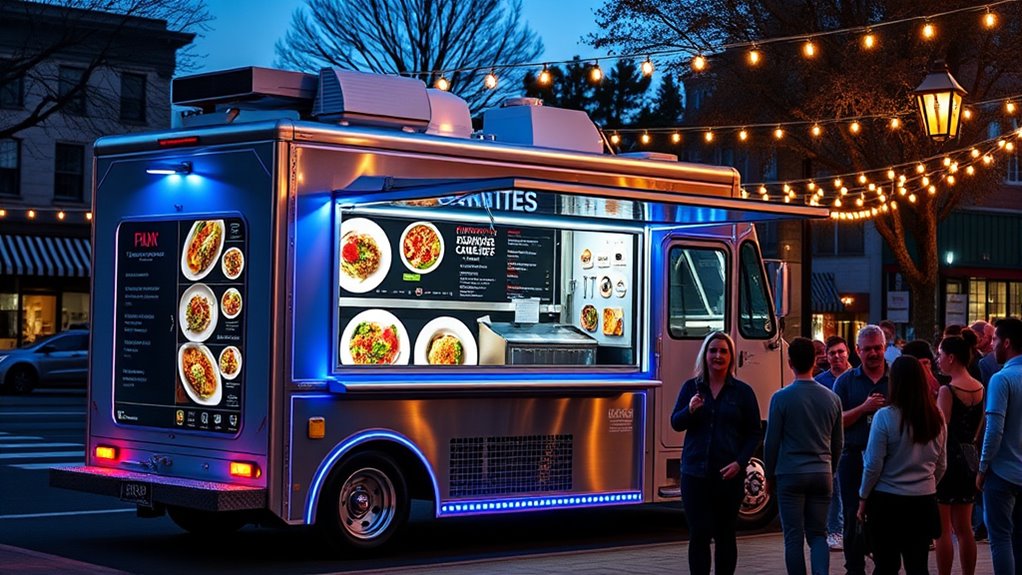
Using wireless card readers can speed up your sales process and reduce errors at the register. Real-time stock tracking software helps you stay on top of inventory levels and avoid shortages. Incorporating these technologies guarantees your food truck runs smoothly and efficiently.
Wireless Card Reader Options
Wireless card readers have become essential for food truck operations, offering quick and secure payment processing on the go. They enable smooth mobile payment transactions and support contactless transactions, making checkout faster and more convenient for customers. When choosing a wireless card reader, consider these options:
- Square Reader – Known for its affordability and reliable contactless payment options, perfect for small food trucks.
- PayPal Zettle – Offers seamless integration with PayPal accounts and supports mobile payments, ideal for versatile payment setups.
- SumUp – Compact design with robust contactless and chip card support, suitable for busy food truck environments.
These options guarantee you can accept various payment methods, increasing sales and customer satisfaction while keeping transactions quick and secure.
Real-Time Stock Tracking Software
Implementing real-time stock tracking software is essential for keeping your food truck’s inventory accurate and up-to-date. It streamlines inventory management, reduces waste, and guarantees you always know what’s in stock. This technology also improves supply chain logistics by providing instant updates on ingredient levels, preventing shortages or overstocking. With real-time data, you can quickly reorder supplies and adjust menus based on availability. Use the following table to understand key benefits:
| Benefit | Impact |
|---|---|
| Accurate Inventory | Prevents stockouts and overstocking |
| Improved Supply Chain | Faster reordering and reduced delays |
| Time Efficiency | Automates tracking, saving time |
| Cost Savings | Minimizes waste and unnecessary purchases |
Marketing and Growing Your Presence
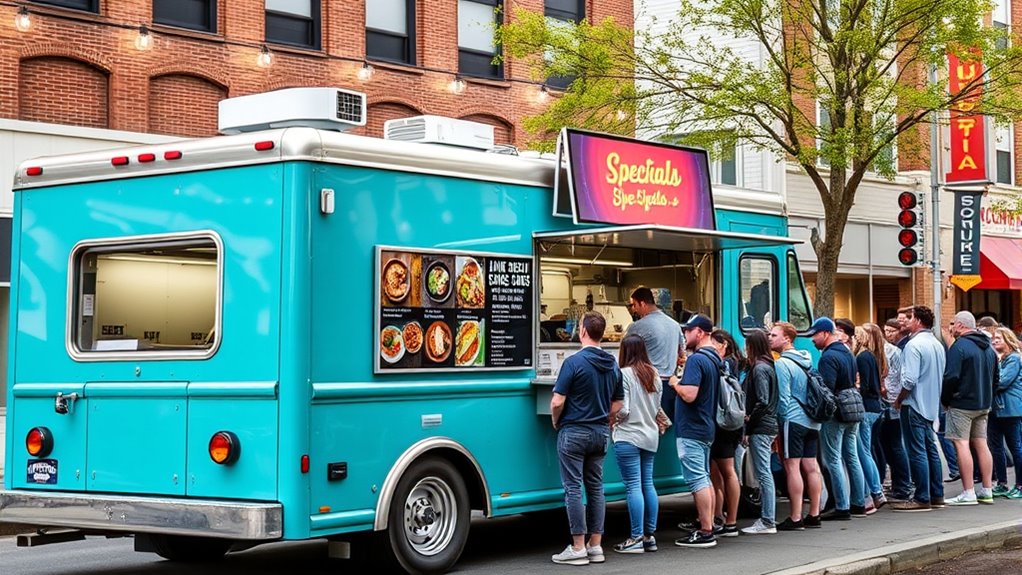
To boost your food truck’s visibility, focus on scheduling at popular events and markets that attract your target crowd. Engage with the community through special promotions and participating in local festivals to build loyalty. These strategies will help grow your presence and turn new customers into regulars.
Popular Event Scheduling Tips
Wondering how to maximize your food truck’s visibility at local events? The key is strategic scheduling. First, plan to attend popular food truck festivals where crowds gather and exposure is high. These events attract food lovers and provide great networking opportunities. Second, coordinate catering partnerships with local businesses or events to secure steady gigs during off-peak festival seasons. This keeps your truck busy and builds relationships. Third, choose your event dates wisely—avoid clashes with major community events or holidays when foot traffic may be lower. Consistent presence at well-chosen events boosts your reputation and spreads word-of-mouth. Effective scheduling not only increases sales but also helps establish your brand as a staple in Worcester’s vibrant food scene.
Engaging Community Events and Promotions
Engaging your community through events and promotions is essential for building a loyal customer base and increasing your food truck’s visibility. Focus on community engagement by participating in local festivals, farmers’ markets, and neighborhood gatherings. Effective event planning helps you connect with residents and showcase your unique offerings. Consider hosting special promotions, like discounts or themed days, to attract new and repeat customers. Collaborate with other local businesses or organizations to expand your reach. Use social media to promote upcoming events and share behind-the-scenes content. Consistent presence at community events not only increases brand awareness but also demonstrates your commitment to Worcester. By actively engaging through thoughtful event planning, you’ll create strong relationships and grow your food truck’s reputation in the area.
Local Networking Opportunities and Resources
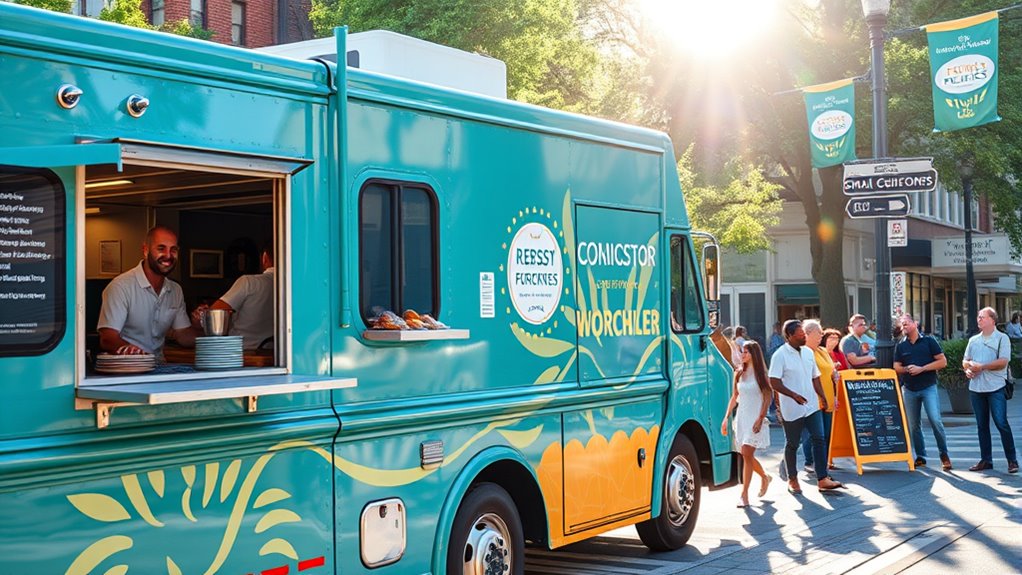
Worcester offers a variety of networking opportunities and resources that can help jumpstart your food truck business. Getting involved in local food festivals is a great way to showcase your offerings and connect with potential customers. Attending vendor networking events allows you to meet fellow entrepreneurs, share tips, and build valuable relationships. Here are some key opportunities:
- Participate in local food festivals to increase visibility and gain feedback.
- Attend vendor networking events hosted by community organizations or chambers of commerce.
- Join online groups and forums dedicated to Worcester’s food truck scene to stay informed and collaborate.
Leveraging these resources can open doors, boost your profile, and help you establish a strong presence in Worcester’s vibrant food community.
Frequently Asked Questions
What Are the Top Trending Cuisines for Worcester Food Trucks?
You’ll find that trending cuisines for Worcester food trucks include innovative takes on tacos, gourmet burgers, and Asian fusion dishes. To stand out, focus on food truck marketing that highlights your unique cuisine innovation, like fusion flavors or locally inspired recipes. Staying current with these trends helps attract customers seeking fresh, exciting options, giving you an edge in a competitive market. Keep experimenting and engaging your audience for ongoing success.
How Do I Find the Best Locations for My Food Truck?
Imagine your food truck as a ship steering Worcester’s bustling harbor. You find the best docking spots through parking strategies and foot traffic analysis, watching where crowds gather and linger. Visit popular events, parks, and busy intersections, then observe daily patterns. Use social media to gauge local interest. By anchoring your truck where people flow, you’ll attract hungry customers enthusiastic to try your cuisine, sailing toward success.
Are There Specific Health Inspections Required in Worcester?
In Worcester, you’ll need to meet specific health inspection standards, guaranteeing your food truck complies with food safety regulations. The local health department conducts inspections to check your food handling, sanitation, and storage practices. Before opening, schedule an inspection and maintain strict adherence to all health codes. Regularly review updates to health regulations to stay compliant, helping you avoid fines and ensure customer safety.
What Permits Are Needed for Outdoor Events in Worcester?
Did you know Worcester hosts over 50 outdoor events annually? For outdoor events, you’ll need to secure the proper permits, including event-specific approvals from the Worcester city government. Make sure your food truck licensing aligns with outdoor event regulations, which may involve health permits, vendor licenses, and a special event permit. Checking with Worcester’s city hall guarantees you meet all requirements and avoid fines, keeping your food truck operation smooth.
How Can I Build a Loyal Customer Base Quickly?
To build a loyal customer base quickly, focus on customer engagement by offering exceptional service and responding to feedback. Use social media actively to share your location, menu updates, and special promotions, encouraging followers to visit often. Host giveaways or loyalty programs to incentivize repeat visits. By creating a strong online presence and genuinely connecting with your customers, you’ll foster loyalty and turn new visitors into regulars fast.
Conclusion
Starting your food truck in Worcester, MA, means crafting a solid plan, understanding local rules, setting up efficiently, budgeting wisely, designing appealing menus, leveraging technology, marketing your brand, and connecting with the community. Embrace each step with enthusiasm, learn from every challenge, and celebrate every success. Keep your passion alive, stay adaptable, and build relationships. With dedication and persistence, you’ll turn your food truck dream into a thriving reality that serves, satisfies, and excites your community.
